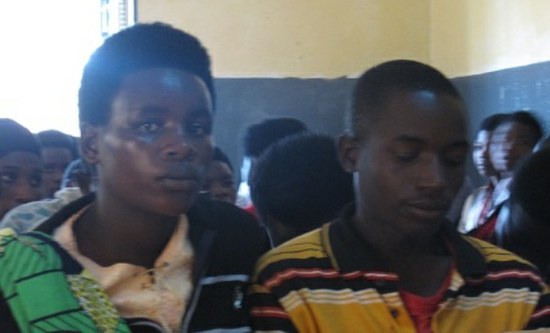 Contribution to MMI Annual Report 2013
Contribution to MMI Annual Report 2013
One determined nurse is making sure no more teenagers in her community will get pregnant against their will. Christina de Vries, reproductive health advisor at Cordaid, was impressed, as she reports from a visit in December 2013, to Myoye, Rwanda.
I was travelling to a remote place in the north of Rwanda, high in the mountains, with my Rwandese counterpart Ariane. The scenery of green mountains is awesome and so beautiful in the eyes of a Dutch person. But Ariane grumbled: “That’s what all the tourists and especially Dutch visitors say, but if you have to make your living in these mountains, all your life, it is a harsh environment. You can give me a flat country any day.”
The trip took us off the tarmac roads, and up and up we went over windy and bumpy roads and increasing coldness and fog. We were visiting health centres, who were due to open youth-friendly services. Rwanda is faced with a very young population and with a high rate of teenage pregnancies, which relatively often end in the tragic death of a girl. We work with schools, youth centres, district authorities, religious leaders and peer educators to decrease this rate. The youth-friendly services are part of this effort and will provide education and support to young people.
On this trip, we visited remote health centres with polite and wellwilling health staff. Some of them had not quite understood the idea yet. They had emptied a store room or a consultation room, and put a sign above the entry door marked ‘youth-friendly service’.
In those cases, Ariane entered into a discussion with the health staff: “What is so youth-friendly about this place? Do the local youth know about this special room? Why would they come here? What are you organizing with them? What kind of changes would you like to make, and how can we help you?”
Close to heaven
And again, up we travelled to the next rows of mountains. Finally, at the point I imagined we couldn’t get any closer to heaven in Rwanda, a sign board appeared: Miyove Health Centre. There was nobody around. After some moments, a nurse with an apron and wet arms ran out of a door to greet us: “I am Constance, please come along, I am busy cleaning the house next door for the youth meeting.” She hurried back to the house, and she showed us around. Once the ice was broken, she did not stop talking.
“The Next Generation programme of the Cordaid consortium is so timely. I saw thirty desperate teenage girls last year, being pregnant against their will. Heartbreaking. Girls from my community. They are school girls, made pregnant often by an adult man. Or they work as a household maid, and have been taken advantage of by the men in the household. Others are girls working at the mines who have got themselves into trouble for a small amount of money. We have many teenage boys who are HIV-positive as well. Young people don’t get proper education on sexuality and on how to prevent pregnancies or the transmission of HIV. We need to change that, otherwise these kind of problems will keep d estroying the lives of teenagers and of entire communities.”
Through the back door
Constance continued in a firm voice: “I decided that I don’t just want a youth-friendly corner in my health centre, but I want an entire house for the youth. They can come through the front door for youth meetings and youth activities. And if they want personal counselling, on HIV, STDs, suspected pregnancies, problems with their parents or their boyfriend or girlfriend, or whatever, then they can come through the back door, where nobody can see them come or go.”
And in a determined manner: “I don’t want to accept this situation anymore. I tell you, my objective is that we have zero teenage pregnancies by the end of next year!”
“Don’t get your life messed up”
We walked back to the main room of the house, and to my amazement in this remote place, the room had filled itself with young people. Some were even standing in the back and others were standing outside looking through the door and the windows.
Constance spoke to them: “This is your house, you can use it for yourselves and for your friends. Have fun, learn things, get any help you need. The health staff is always there for you and will always give you what you need. Don’t get your life messed up with HIV or early pregnancies.”
Constance: she made my day, she gave me hope, but most importantly she is giving hundreds and hundreds of teenagers the opportunities in life they deserve. Communities can change. The flame of one person can be enough to light the fire for flourishing communities.
Contribution to the Annual Report 2013 of the MMI Network
More information: www.cordaid.nl
